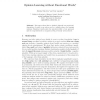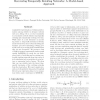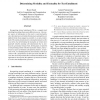92 search results - page 15 / 19 » Semantic Inference at the Lexical-Syntactic Level |
AI
2009
Springer
14 years 2 months ago
2009
Springer
This paper shows that a detailed, although non-emotional, description of event or an action can be a reliable source for learning opinions. Empirical results show the practical uti...
CICLING
2010
Springer
14 years 27 days ago
2010
Springer
We introduce an Information Extraction (IE) system which uses the logical theory of an ontology as a generalisation of the typical information extraction patterns to extract biolog...
JOCN
2011
13 years 2 months ago
2011
■ This study examined neural activity associated with establishing causal relationships across sentences during on-line comprehension. ERPs were measured while participants read...
ICML
2007
IEEE
14 years 8 months ago
2007
IEEE
A plausible representation of relational information among entities in dynamic systems such as a living cell or a social community is a stochastic network which is topologically r...
SEMCO
2007
IEEE
14 years 2 months ago
2007
IEEE
Recognizing textual entailment (TE) is a complex task involving knowledge from many different sources. One major source of information in this task is event factuality, since the ...



